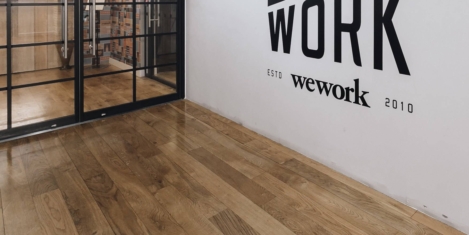January 30, 2016
Coworking goes mainstream + Sit stand working + Future for tech offices 0
 In this week’s Insight newsletter; Mark Eltringham analyses the impact of the sit-stand movement and suggests that the I-phone is a very isolating piece of equipment; Georgi Georgiev says remote work is no longer just a freelancer’s game; and Paul Goodchild explains why co-working is shaping office design more than you’d imagine. A new report outlines the key future property trends for TMT workplaces; parents are at greater risk of burn out as they strive for work life balance; fewer than one in ten (8 percent) of UK organisations currently have a standalone wellbeing strategy; the positive benefits of active work are revealed and the UK’s CEO’s worries about cyber-risks. Download the latest issue of Work&Place and access an Insight Briefing produced in partnership with Connection, which looks at agile working in the public sector. Visit our new events page, follow us on Twitter and join our LinkedIn Group to discuss these and other stories.
In this week’s Insight newsletter; Mark Eltringham analyses the impact of the sit-stand movement and suggests that the I-phone is a very isolating piece of equipment; Georgi Georgiev says remote work is no longer just a freelancer’s game; and Paul Goodchild explains why co-working is shaping office design more than you’d imagine. A new report outlines the key future property trends for TMT workplaces; parents are at greater risk of burn out as they strive for work life balance; fewer than one in ten (8 percent) of UK organisations currently have a standalone wellbeing strategy; the positive benefits of active work are revealed and the UK’s CEO’s worries about cyber-risks. Download the latest issue of Work&Place and access an Insight Briefing produced in partnership with Connection, which looks at agile working in the public sector. Visit our new events page, follow us on Twitter and join our LinkedIn Group to discuss these and other stories.










 Companies are rethinking the tools they use to keep employees engaged and loyal – especially at a time when flexibility and choice are increasingly important to an workforce that craves mobility and choice. A newly released survey from
Companies are rethinking the tools they use to keep employees engaged and loyal – especially at a time when flexibility and choice are increasingly important to an workforce that craves mobility and choice. A newly released survey from 
 According to an analysis of the just-released 2014 American Community Survey (ACS) conducted by
According to an analysis of the just-released 2014 American Community Survey (ACS) conducted by 



















November 5, 2015
Data transforms the roles of offices and the people who manage them
by Philip Ross • Comment, Facilities management, Technology, Workplace
(more…)